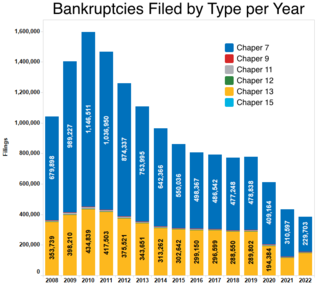Bankruptcy is a legal process through which people or other entities who cannot repay debts to creditors may seek relief from some or all of their debts. In most jurisdictions, bankruptcy is imposed by a court order, often initiated by the debtor.

Insurance is a means of protection from financial loss in which, in exchange for a fee, a party agrees to compensate another party in the event of a certain loss, damage, or injury. It is a form of risk management, primarily used to protect against the risk of a contingent or uncertain loss.

Maxims of equity are legal maxims that serve as a set of general principles or rules which are said to govern the way in which equity operates. They tend to illustrate the qualities of equity, in contrast to the common law, as a more flexible, responsive approach to the needs of the individual, inclined to take into account the parties' conduct and worthiness. They were developed by the English Court of Chancery and other courts that administer equity jurisdiction, including the law of trusts. Although the most fundamental and time honored of the maxims, listed on this page, are often referred to on their own as the 'maxims of equity' or 'the equitable maxims', it cannot be said that there is a definitive list of them. Like other kinds of legal maxims or principles, they were originally, and sometimes still are, expressed in Latin.
A lien is a form of security interest granted over an item of property to secure the payment of a debt or performance of some other obligation. The owner of the property, who grants the lien, is referred to as the lienee and the person who has the benefit of the lien is referred to as the lienor or lien holder.
Interpleader is a civil procedure device that allows a plaintiff or a defendant to initiate a lawsuit in order to compel two or more other parties to litigate a dispute. An interpleader action originates when the plaintiff holds property on behalf of another, but does not know to whom the property should be transferred. It is often used to resolve disputes arising under insurance contracts, such as when a Plaintiff with a personal injury claim has a dispute with medical providers over the payment out of a settlement for medical services provided to treat the Plaintiff's injuries.
In finance, a surety, surety bond, or guaranty involves a promise by one party to assume responsibility for the debt obligation of a borrower if that borrower defaults. Usually, a surety bond or surety is a promise by a surety or guarantor to pay one party a certain amount if a second party fails to meet some obligation, such as fulfilling the terms of a contract. The surety bond protects the obligee against losses resulting from the principal's failure to meet the obligation. The person or company providing the promise is also known as a "surety" or as a "guarantor".

In the United States, bankruptcy is largely governed by federal law, commonly referred to as the "Bankruptcy Code" ("Code"). The United States Constitution authorizes Congress to enact "uniform Laws on the subject of Bankruptcies throughout the United States". Congress has exercised this authority several times since 1801, including through adoption of the Bankruptcy Reform Act of 1978, as amended, codified in Title 11 of the United States Code and the Bankruptcy Abuse Prevention and Consumer Protection Act of 2005 (BAPCPA).
A guarantee is a form of transaction in which one person, to obtain some trust, confidence or credit for another, agrees to be answerable for them. It may also designate a treaty through which claims, rights or possessions are secured. It is to be differentiated from the colloquial "personal guarantee" in that a guarantee is a legal concept which produces an economic effect. A personal guarantee, by contrast, is often used to refer to a promise made by an individual which is supported by, or assured through, the word of the individual. In the same way, a guarantee produces a legal effect wherein one party affirms the promise of another by promising to themselves pay if default occurs.
Liability insurance is a part of the general insurance system of risk financing to protect the purchaser from the risks of liabilities imposed by lawsuits and similar claims and protects the insured if the purchaser is sued for claims that come within the coverage of the insurance policy.
Repossession, colloquially repo, is a "self-help" type of action in which the party having right of ownership of a property takes the property in question back from the party having right of possession without invoking court proceedings. The property may then be sold by either the financial institution or third party sellers.
In finance, a security interest is a legal right granted by a debtor to a creditor over the debtor's property which enables the creditor to have recourse to the property if the debtor defaults in making payment or otherwise performing the secured obligations. One of the most common examples of a security interest is a mortgage: a person borrows money from the bank to buy a house, and they grant a mortgage over the house so that if they default in repaying the loan, the bank can sell the house and apply the proceeds to the outstanding loan.
Marine insurance covers the physical loss or damage of ships, cargo, terminals, and any transport by which the property is transferred, acquired, or held between the points of origin and the final destination. Cargo insurance is the sub-branch of marine insurance, though marine insurance also includes onshore and offshore exposed property,, hull, marine casualty, and marine losses. When goods are transported by mail or courier or related post, shipping insurance is used instead.
Insurance law is the practice of law surrounding insurance, including insurance policies and claims. It can be broadly broken into three categories - regulation of the business of insurance; regulation of the content of insurance policies, especially with regard to consumer policies; and regulation of claim handling wise.

The Marine Insurance Act 1906 is a UK act of Parliament regulating marine insurance. The act applies both to "ship & cargo" marine insurance, and to P&I cover.

Lister v Romford Ice and Cold Storage Co Ltd[1956] UKHL 6 is an important English tort law, contract law and labour law, which concerns vicarious liability and an ostensible duty of an employee to compensate the employer for torts he commits in the course of employment.

Cornhill Insurance plc v Improvement Services Ltd [1986] 1 WLR 114 is a UK insolvency law case concerning the presentation of a winding up petition.

Marshalling is an equitable doctrine applied in the context of lending. It was described by Lord Hoffmann as:
[A] principle for doing equity between two or more creditors, each of whom are owed debts by the same debtor, but one of whom can enforce his claim against more than one security or fund and the other can resort to only one. It gives the latter an equity to require that the first creditor satisfy himself so far as possible out of the security or fund to which the latter has no claim.
Insolvency in South African law refers to a status of diminished legal capacity imposed by the courts on persons who are unable to pay their debts, or whose liabilities exceed their assets. The insolvent's diminished legal capacity entails deprivation of certain of his important legal capacities and rights, in the interests of protecting other persons, primarily the general body of existing creditors, but also prospective creditors. Insolvency is also of benefit to the insolvent, in that it grants him relief in certain respects.
Insurance in South Africa describes a mechanism in that country for the reduction or minimisation of loss, owing to the constant exposure of people and assets to risks. The kinds of loss which arise if such risks eventuate may be either patrimonial or non-patrimonial.

Lord Napier and Ettrick v Hunter [1993] AC 713 was a judicial decision of House of Lords relating to the right of subrogation where an insurer pays with respect to an insured risk and the assured later recovers damages from a third party with respect to that same loss. The case also determined that the right of subrogation is fortified by an equitable lien over the proceeds of the claim against the third party.







